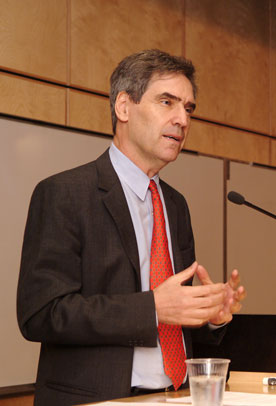Difference between revisions of "Michael Ignatieff"
(adding image) |
DavidB4-bot (Talk | contribs) (→top: Spelling, Grammar, and flow, typos fixed: full time → full-time) |
||
| (13 intermediate revisions by 7 users not shown) | |||
| Line 1: | Line 1: | ||
| − | [[Image:Michael Ignatieff.jpg|right|thumb|Michael Ignatieff]]'''Michael Ignatieff''' is the | + | [[Image:Michael Ignatieff.jpg|right|thumb|Michael Ignatieff]]'''Michael Ignatieff''' is the former leader of the [[Liberal Party of Canada]], the previous majority [[political party]] in [[Canada]]. He is an academic and was a university professor in both [[Great Britain]], and in the [[United States]] at the Kennedy School of Government at [[Harvard]] University. Ignatieff has been continuously sited as an opportunist due to his many personal and political ambitions. |
| − | In 2005 while still working outside the country the Liberal Party of Canada successfully drafted him to run for Member of [[Parliament]] | + | In 2005, while still working outside the country, the Liberal Party of Canada successfully drafted him to run for Member of [[Parliament]] in an [[Ontario]] riding for an upcoming federal election. Ignatieff moved back to Canada after he had spent the last twenty years working outside the country. |
| − | + | The Liberals believed that if they were defeated in the 2006 federal election (which they were) that Ignatieff could provide a sense of renewal to the party. He enter the 2006 Liberal leadership race but was defeated by [[Stephane Dion]], most notably because of Bob Rae's decision to not drop out and support Ignatieff to prevent Stephane Dion from winning. Rae also supported no candidate after being eliminated, this is said to have cause Ignatieff to lose. | |
| − | + | In December 2008, after Dion was ousted as leader, Ignatieff served as interim leader of the party. In 2009 he was successful in pressuring the two other candidates for the May 2009 leadership convention to drop out. This lead him to become leader of the party by acclamation. As leader he tried to force unpopular and unwanted federal elections. | |
| − | It is also believed that during the 2010 Winter Olympics he may have cheered for and supported Russia over Canada. | + | ''Blood and Belonging'', a book by Ignatieff has also been criticized for its anti-Ukrainian sentiment. In the book, Ignatieff openly discusses Russian stereotypes towards Ukrainians. |
| + | |||
| + | It is also believed that during the 2010 Winter Olympics he may have cheered for and supported Russia over Canada. {{fact}} | ||
| + | |||
| + | In the 2011 federal election, he led the Liberal Party to its worst electoral defeat becoming the third party in the House of Commons for the first time in Canadian history. He subsequently returned to academia at the University of Toronto before returning to the United States full-time. | ||
[[Category:Canadian Political People]] | [[Category:Canadian Political People]] | ||
[[Category:Liberals]] | [[Category:Liberals]] | ||
| − | {{DEFAULTSORT: Ignatieff, Michael}} | + | {{DEFAULTSORT:Ignatieff, Michael}} |
Latest revision as of 05:33, May 31, 2018
Michael Ignatieff is the former leader of the Liberal Party of Canada, the previous majority political party in Canada. He is an academic and was a university professor in both Great Britain, and in the United States at the Kennedy School of Government at Harvard University. Ignatieff has been continuously sited as an opportunist due to his many personal and political ambitions.In 2005, while still working outside the country, the Liberal Party of Canada successfully drafted him to run for Member of Parliament in an Ontario riding for an upcoming federal election. Ignatieff moved back to Canada after he had spent the last twenty years working outside the country.
The Liberals believed that if they were defeated in the 2006 federal election (which they were) that Ignatieff could provide a sense of renewal to the party. He enter the 2006 Liberal leadership race but was defeated by Stephane Dion, most notably because of Bob Rae's decision to not drop out and support Ignatieff to prevent Stephane Dion from winning. Rae also supported no candidate after being eliminated, this is said to have cause Ignatieff to lose.
In December 2008, after Dion was ousted as leader, Ignatieff served as interim leader of the party. In 2009 he was successful in pressuring the two other candidates for the May 2009 leadership convention to drop out. This lead him to become leader of the party by acclamation. As leader he tried to force unpopular and unwanted federal elections.
Blood and Belonging, a book by Ignatieff has also been criticized for its anti-Ukrainian sentiment. In the book, Ignatieff openly discusses Russian stereotypes towards Ukrainians.
It is also believed that during the 2010 Winter Olympics he may have cheered for and supported Russia over Canada.[Citation Needed]
In the 2011 federal election, he led the Liberal Party to its worst electoral defeat becoming the third party in the House of Commons for the first time in Canadian history. He subsequently returned to academia at the University of Toronto before returning to the United States full-time.
